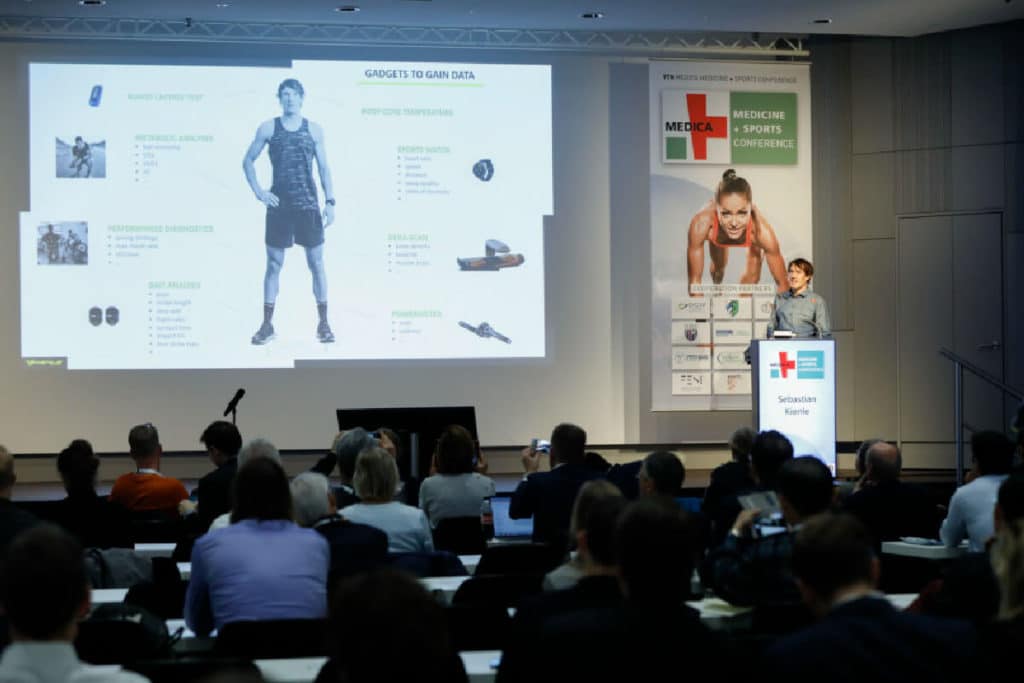Table of Contents
The world-leading medical trade fair MEDICA will launch its in-person event again at the Düsseldorf Trade Fair Centre this year, along with the accompanying MEDICA MEDICINE + SPORTS CONFERENCE. It has been part of the MEDICA program highlights for nine years and will bring together internationally renowned sports doctors, sports scientists, visionaries, physiotherapists, sports tech bods and experts for an interdisciplinary dialogue on innovative approaches in prevention, regeneration and rehabilitation in elite sport and sport for maintaining health.
This will be held from 17 to 18 November (MEDICA 2021 will run from 15 to 18 November). This English-speaking conference is accredited as a category A continuous training event by the North Rhine Medical Association and will take place in the Düsseldorf Congress Center (CCD Süd). The top themes this year include returning to sport after a SARS-CoV-2 infection, tailored training programs for active ageing and digital innovations for sports medicine. In line with the hybrid event concept for MEDICA, visitors can participate in the conference using either an in-person ticket or a digital ticket, which allows them to call up the live stream.
Returning to Sports
On Wednesday 17 November, the session on the topic “Returning to Sports” after having corona will kick off the conference, with the focus being on long COVID. Lena Mikulic is affected by long COVID. She won second place in karate in the German U21 league and had even had a television documentary made about her.
After falling ill with corona in November 2020, and feeling that she had only had a mild case, she realised that she could no longer train like she used to. When Prof. Jürgen Steinacker examined her in Ulm in March 2021, she was diagnosed with long COVID, including myocarditis and pericardial effusion. Mikulic and Steinacker will give talks at the MEDICA MEDICINE SPORTS and might even be made up, is evidently incorrect.
Professor Steinacker makes this clear in his talk. Elite athletes are used to paying a lot of attention to their bodies, and Steinacker states: “We’re not talking about a 5% drop in performance, we’re talking about 30% to 50%”. A 32-year-old’s oxygen uptake, for example, might drop to the amount expected for a 50-year-old. SARS-CoV-2 is not the only illness to result in this.
Steinacker has also observed fatigue following other viral infections, although this is mostly dependent on the genetics of the relevant person and is therefore less frequent. SARS-CoV-2, however, is capable of infecting swathes of the population and damaging their health. Experts now assume that 10 to 20% of those infected will go on to have long COVID.
Long COVID has the traits of an autoimmune disease
Steinacker highlights the fact that long COVID has the traits of an autoimmune disease: the immune system attempts to fight the virus, but ultimately starts attacking the body’s own cells. In addition, the virus has also been observed to continue for longer periods in some patients.
A potential cause for this severe course of the disease, which occurs in some, could be that a typical virus protein, the spike protein, is very allergenic and causes the macrophages of the immune system, among other elements, to go into hyperactivity, thus interfering with function. The result is that not only the heart but also the muscles and the nervous system are damaged. However, the lungs are no longer as heavily affected in long COVID, unlike in the acute disease.
There is still no standard therapy
Treatment is complex. “There is no standard therapy”, continues Jürgen Steinacker, who believes that a multimodal approach is required. Therapy must limit the infection, should be anti-virally effective and comprises the implementation of immunomodulators such as vitamin D and omega-3 fatty acids, along with plant-based supplements such as phytosterols.
Neurological complications also need to be treated. Pseudoallergies, food intolerances and stomach ache can occur: “Sometimes, an individual’s medication plan might fill a whole page”, surmises Steinacker. The University Clinic of Ulm is participating in the multicentric cohort study CoSmo-S which seeks to specify recommendations on how to start doing sport again following recovery from a SARS-CoV-2 infection.
In Ulm alone, over 180 study participants were included, and across Germany the figure has already risen to 1,500 to 1,800. This figure alone demonstrates how much this challenge is growing. In Baden-Württemberg, the big EPILOC study has been started, led by Prof. Wienfried Kern from Freiburg with participation from Tübingen, Heidelberg and Ulm. The study encompasses 50,000 post-infection patients who are surveyed to record the frequency and severity of long COVID in more detail.
Every elite athlete must be vaccinated
All in all, one thing is clear for Prof. Jürgen Steinacker: “every elite athlete must be vaccinated”! This applies for indoor and contact sports, such as fencing or boxing, in particular. Steinacker illustrates the wide-reaching extent that the personal consequences that may be wrought by COVID-19 can attain using examples: “I am taking care of professional football players who are currently having trouble simply going for a walk, and this is weeks after the SARS-CoV-2 infection has run its course”.
Athletes are not the only people to experience a severe deterioration in performance following COVID-19: “if an older person suddenly has trouble getting up the stairs, then this is often seen as a normal part of ageing”. However, it can also be a sign of long COVID and have fatal consequences for the quality of life of the individual.
Prof. Claus Reinsberger, Paderborn, will speak on the neurological manifestations such as the COVID-19 “brain fog” in Düsseldorf. Brain fog encompasses symptoms such as memory issues, poor concentration and confusion. New findings on subjects from lung disease to red blood cells will be explained by Prof. Wilhelm Bloch from the German Sport University of Cologne.
The Olympics during a pandemic, and after
COVID-19 has not only led to issues for numerous athletes as individuals, it has also influenced this year’s Olympic Games in Tokyo. As the leading Olympic Doctor for the German Olympic Sports Confederation (DOSB) and President of the German Association for Sports Medicine and Prevention (DGSP), Prof. Bernd Wolfarth will discuss elite sport during a pandemic at the sports medicine conference in Düsseldorf. In Session 2, he reports on the conclusions that can be drawn from the Tokyo Olympics and how they will impact the preparations for the Olympic Winter Games which will be held from 4 to 20 February 2022 in Peking.
Under the overarching theme “Future Concepts in Sport Medicine”, Prof. Wolfarth, Prof. Yannis Pitsiladis, Dr. Lutz Graumann and other speakers will look back at Tokyo and will also look to the future to predict what elite sport will look like in 2050 and will dare to explore visionary elite sports projects, from team sports such as ice hockey and football to the physical performance medicine of the future.
Pitsiladis is a member of the IOC Medical and Scientific Commission and coined the term “technology doping” this year. Dr. Lutz Graumann is President of the International Association of Performance Medicine and Medical Coordinator for the German Ice Hockey Association. He is thus an expert when it comes to the future of ice hockey. In the subsequent Guided Innovation Tour session, innovative products with a high level of relevance for sports medicine will be presented in an expedition through the MEDICA 2021 halls.
Tailored training programs for active ageing
On Thursday 18 November, the MEDICA MEDICINE SPORTS CONFERENCE will primarily base its events around tailoring training and movement programs. The “Fit for life – tailored exercise programs for active ageing and the elderly” session focuses on tailored training programs for active ageing and older people. Prof. Bettina Wollesen, Vice-President of the German Society of Sport Science, will present training interventions which boost cognitive performance.
Under her leadership, the PROCARE prevention program for care facilities has been implemented. This is oriented towards carers and those receiving care. Within the scope of a needs analysis for the project, it became clear: care home residents who were believed to be cognitively fit without any diagnosis of a psychological illness were not able to find their way through the care home independently and did not know how to get back to their room from the place that the examination was carried out.
Development and intervention strategies that take barriers into account and tailor measures to the specific needs of older adults could break down the barriers to physical activity. Dr. Timo Hinrichs from the University of Basel will tell the audience how this can be achieved.
Simple short programs which can become part of any daily routin
The exercises that are particularly important for healthy ageing will be explained by the orthopaedists and sports doctors Dr. Christian Schneider and Dr. Thore Haag. They are known as the fitness docs, and show how everyone can combat the ageing process and stay mentally and physically fit by ensuring that a minimum of movement is undertaken.
Exercises for mobility, strength and stability support basic fitness and prevent complaints. The simple short programs enable the training to be integrated into a daily routine effortlessly. Private lecturer Dr. Thomas Sanjay Weber-Spickschen will show the typical issues that occur in old age and how therapy can be provided for these, or how training to combat them should look.
Innovation in sports medicine diagnostics
In session 5 on evidence-based diagnostics, new methods and findings will be presented – from cardiac MRIs to non-invasive measurement of vital signs and performance parameters such as lactates and blood glucose, to wearable technology. In session 6, the focus is on performance, regeneration and recovery in elite sport. Prof. Alexander Ferrauti will show results and recommendations for action for daily fine adjustment of monitoring, training control and regeneration management in competitive tennis. Prof. Michael Kellmann is also involved in the long-term German Federal Institute for Sports Science (BISp) project “Management of Regeneration in Elite Sports” and will present instruments for psychological assessment of the recovery-stress state.
In the concluding session 7 on 18 November, digital innovations from the smartwatch-based running app for runners, to LED patches for regeneration, to rehabilitation solutions for the tennis sector and new solutions to measure core stability will be presented.
cite MEDICA MEDICINE + SPORTS CONFERENCE, further information at 9th MEDICA MEDICINE SPORTS CONFERENCE







